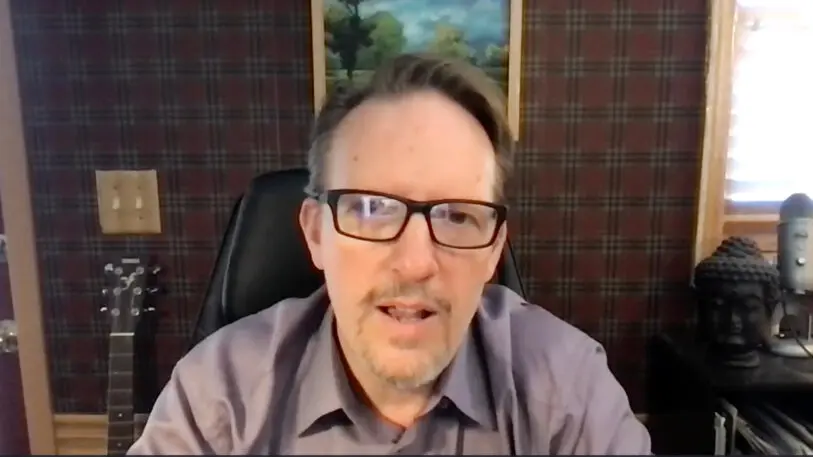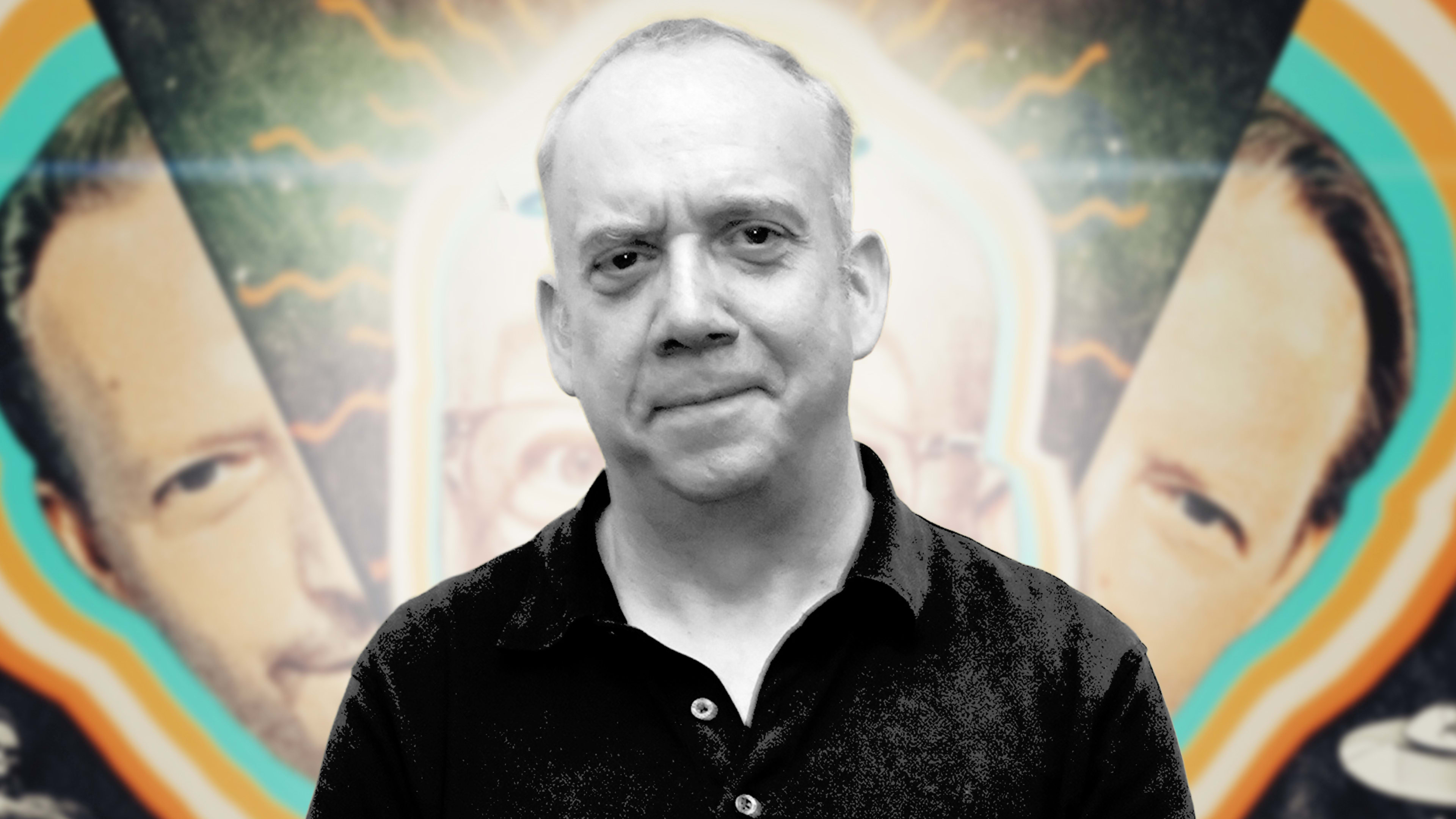Monsters, AI, scary DALL-E art, Marcus Aurelius, cannibalism. An interview that covers such a wide range of topics was probably a pretty good chinwag. And that’s what happened when Fast Company spoke to Emmy Award-winning actor Paul Giamatti and philosopher/author Stephen Asma about their new podcast—called, appropriately enough Chinwag—which debuts today on all major podcast platforms.
The podcast finds Giamatti and Asma talking each week with a different celebrity guest about any number of subjects: science, the occult, psychology, Bigfoot, and the idea that we are, in fact, living in a simulation. The two hosts bring a down-to-earth and comical approach to issues both serious and non—and that’s true in both the podcast and this conversation with Fast Company, which has been edited for length and clarity.
Fast Company: The name of your new podcast is Chinwag, which is just British for conversation, right? Why did you like that name?
Paul Giamatti: Steve and I would just say that when we would get together on Zoom. We would set up a chinwag session. So that’s just what stuck to the name of the show.
FC: I know you guys met online, but how did that happen? How does a famous actor meet a philosopher and start a podcast.
PG: It was through an organization called Morbid Anatomy. They used to [be] a museum in Brooklyn, but they’re kind of international now. They went online, although not exclusively.
Stephen Asma: They have these talks on wonderful sorts of crazy topics and interesting talks, and that’s how Paul and I met. I was giving a talk on imagination, and then we started emailing.
PG: And then we just started having these conversations about books and ideas and science and all kinds of stuff. It was a couple of years ago, in the kind of beginning of the pandemic.
FC: Stephen, I know you’re something of an expert on monsters. Did your interest in the imagination grow out of that?
SA: Yeah, I think that’s right. When I did the Monsters book I was interested in monsters specifically, but then I began to see—because I do a lot of philosophy-of-mind stuff—that there was a bigger question here about how the imagination works in general. And I do visual art and play music, and that was one of the things that Paul and I bonded on. He draws too, and we started talking about imagery and animation.
FC: Can you give us a working definition for the “philosophy of mind”?
SA: Yeah, it’s sort of the combination between philosophy and psychology, which is, How does the mind work? Some people think it’s made up of these preset modules that you’re born with; other people think you learn everything when you’re a baby. Some people were studying everything in terms of behaviorism because you can’t observe the imagination. Only now, I think, is the imagination coming back into vogue. People are starting to look at it like it’s an important faculty in the mind. I think Paul and I are in agreement that we think it’s the essence of the mind, like it’s the core operating system.
PG: I think it’s the most important part of consciousness. It’s almost the point to it. It’s the only thing that makes any sense. Otherwise, I don’t know why the hell we have it, you know.
FC: I’ve certainly been thinking about that myself because we’re at this point in our evolution where we’re watching as AI starts taking over more and more human functions. I like the idea that humans are good at thinking creatively and may always be irreplaceable in that respect.
PG: Yeah, it seems like it, although you know the computers are coming. That DALL-E thing is coming up with some pretty great paintings and imagery. I mean, it is a result of the human mind. So it is an interesting sort of interface of the human mind and computer. We train them to do that stuff. Will we always be superior to them in creativity? I don’t know. I do think it made us unique for a while. Maybe we’re not really that unique anymore, though I don’t know what an animal imagines. We’re going to talk to a dream expert at some point, and I’m interested to know whether we can know what a gorilla is dreaming.
FC: You make a good point. Getting back to this monsters idea, there are artists that I follow on Twitter who specialize in giving prompts to things like DALL-E and Stable Diffusion, and they’re generating some of the scariest stuff I’ve ever seen, mainly because the AI models conceive of humanity in a very different way.
SA: I follow a lot of artists, and some of them do horror stuff. But with AI like DALL-E, you can basically multiply generations so rapidly. If you wait for a guy to do a painting and you’re like, This is kind of spooky, but this part’s not, you know it’s going to take forever to generate a body. But with AI you can keep clicking “creepier, creepier” and you get new generations. It’s like breeding fruit flies in the lab.
PG: It’s like it descends through all the levels of the imagination faster. There is definitely something quite uncanny-looking about some of that stuff. Maybe because it’s not coming out of a human mind, [there’s] something that makes it a little bit icy and creepy.
FC: I imagine you guys already recorded some of these podcasts ahead of the launch, is that right?

PG: Yeah, we’ve done like seven of them, and I think we’re gonna do 20 of them.
SA: Last week we talked to William Shatner. That was pretty amazing, and in true Chinwag fashion we never asked him about Star Trek.
FC: Did you ask him about more conceptual things then?
PG: One of the points of the show is not to have somebody come on and be like, “Tell me about blah, blah, blah [whatever made them famous].” It’s more like, “Tell me what you think about reincarnation.”
SA: Yeah, you hear entertainers will often just be asked about their personal lives, the movie they’re just in, and they don’t always want to talk about that. And if you invite academics or scientists they usually get asked about this narrow slice of expertise that they have. But people are interesting, they have all kinds of wide, varying fascinations and curiosities.
FC: Can you tell me a little bit about what you did at your SXSW appearance?
PG: Well, Steve and I did a little impromptu musical of fragmentation as well because Steve is an accomplished blues guitar player. He’s played with luminaries like Bo Diddly and Buddy Guy. And I fuck around on a theremin. So we did a little impromptu concert, and then it was just me and Steve talking—some of the episodes will just be me and Steve just talking. We talked about monsters. People seemed to really dig it. I thought it went over pretty well. People were asking about Mothman and the Chupacabra.
SA: Yeah, we talked about why monsters first interested us when we were young, and what monsters mean to the larger culture.
FC: It’s always good to have a theremin around if you’re going to talk about monsters! But you brought up an interesting question: What was the first monster in your life? Seems like there could be a lot packed into that.

SA: Each of us has a different childhood experience with something that scared the hell out of you. It can be very unique and idiosyncratic. But then, there seems to be these universal archetypes, like you said. A lot of people are afraid of some basic phobias: Spiders scare huge numbers of populations across the globe, snakes, and the dark.
All of us are interested in the wild man, or something that’s in the woods, like Bigfoot [or] the werewolf. If you’re from Northern Europe, or your ancestors are, then wolves would have been real predators. But in Indonesia, they don’t have a werewolf. They have a werecrocodile, and in Native American cultures they have a werebear. So, I think some of these archetypes might be connected to specific predators, and then some of them are just culturally reinforced.
PG: We were talking at South by Southwest about how the primal idea of a person turning into the animal is really resonant. The idea that you can become an animal, that you have the ability to be an animal inside of you is a very powerful idea. So things like the wolfman was really resonant. Dr. Jekyll and Mr. Hyde—something where you had this duality, and you had an animal inside. That felt like a very powerful, basic archetypal image.
SA: And the Greeks were really troubled by this too. A lot of the tragedies were about some kind of monstrous force inside you—you know, Hybris—and it just comes out. It crashes around and just destroys everything.
FC: It’s interesting to me because there are people in politics who have been trying to give us permission over the last eight years to act a little bit more like that animal, to act a little bit more brutal, and maybe get a little closer to that thing inside us that misbehaves.
PG: I feel like periods of enlightenment and periods of rationality are the aberrations here. I realize most of the time people are pretty savage. If you think about it in world history, there’s not that many leaders who were really that great. Most of them were pretty brutal and horrible, and even the ones who were great were kind of like Marcus Aurelius out there leading armies and killing a lot of fucking people. And then he would go home and just be like, This is troubling to me . . . I must look within the inner fortress of peace and solitude. And it’s like, dude, you’re still killing a lot of people. [Laughs]
SA: Hey, he had to run an empire, man. Come on. [Laughs]
PG: That’s what I mean. I just feel like rationality is the aberration.
SA: So it’s just Lord of the Flies, generally, most of the time.
PG: Exactly. If we really had our druthers, most of the time we’d be sitting around in our own poop, just eating each other. We would just let it all hang out if we could. [Laughs] Cannibalism is a good idea. We should talk about cannibalism on one of these podcasts.
SA: Yeah, let’s put that on the docket. That’s a good Chinwag.
PG: It’s an interesting subject.
FC: I can imagine the advertisement for that podcast. There have been several movies made about cannibalism. Recently, we had Bones and All.
SA: There’s been some interesting legal cases where people have actually run an ad, and they ask another person to kill and eat them. And the question is, Is this legal? If somebody wants to be eaten, can you really say no?
That’s the kind of thing that we’re interested in . . . these areas where there’s a breakdown between what you know, and what you don’t know—as Paul has called it, “at the edge of the known.”
Recognize your brand’s excellence by applying to this year’s Brands That Matter Awards before the final deadline, June 7.
Sign up for Brands That Matter notifications here.
